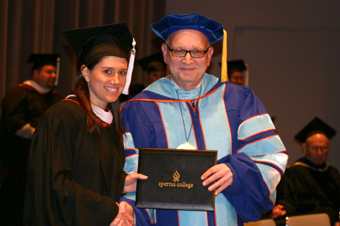Who’s a master now?
Permanent link All Posts

On March 27 I graduated with a Master of Arts in Jewish Professional Studies—MAJPS for short—from the Spertus Institute in Chicago. It’s a mouthful to say, so instead I’ve taken to telling people I’m now a “master” Jewish professional.
After giving up my Monday nights for two years, and pouring my heart and soul into my final project, I’ve finally reached the finish line. Do I really feel like a master of anything? I’m not so sure.
Does working full-time at a Jewish organization and studying Jewish life in my free time make me a master? Does reading a lot of material and writing a lot of papers about Jewish communal life, history, culture, education, leadership, philosophy (the list goes on), make me a master? What about networking with and learning from Jewish communal professionals in Chicago and experts throughout the country? I don’t know.
What I do know is that I am definitely a more educated, better connected and happier Jewish professional—and I made a lot of great friends along the way.
The MAJPS program, in addition to providing courses on relevant issues in contemporary Jewish life and links back to Jewish civilization and culture, brings diverse groups of Jewish professionals together to study in cohorts of about 15 to 20 students. We studied everything from Israeli dancing to the Jews of Early Modern Venice, from grant writing to the future of the American Jewish community.
For me it wasn’t just the rich topics or in-depth seminars with experts in the field that made the program; it was going through these courses and seminars with my cohort that created such a meaningful experience.
We are a small, but mighty, group—some of us work at overnight camps, others at day schools, synagogues, Federation, plus a few brave souls who are hoping to make the transition into Jewish communal work. Though we range in age, and are all at different points in our lives and careers, we somehow blended into a family over the past two years. We challenged each other to think deeper and reach higher, we encouraged and motivated each other—okay, sometimes more like whined and complained to one another—to keep going when we felt like we just couldn’t write another paper, and most importantly, we celebrated milestones and supported each other during difficult times.
Having this type of camaraderie in an educational setting is both a unique and wonderful experience, and I encourage everyone to take advantage of an opportunity like this one.
And now, here we are—we’ve received our diplomas and thrown our caps up in the air. But where do we go from here?
Maybe being a master has nothing to do with actually mastering material or writing papers. Maybe it’s a charge. A challenge. To never stop learning, to have a thirst for knowledge and understanding of the Jewish community that can never be quenched. To always make the time to continue learning. To strive for bigger and better.
Maybe these past two years, Monday night classes were our training wheels. They kept our minds sharp and our wheels turning. We were preparing for the real task at hand—now that we are equipped with all this knowledge, what will we choose to do with it?
And maybe, now that the program has ended and our training wheels have been removed, those of us who can somehow steer our community into the future will become the real masters.



.jpg)



